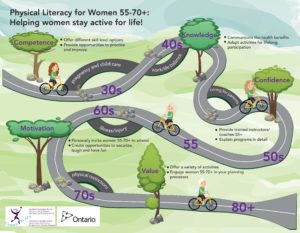Time has passed quickly from the first statistical commentary on the risks of falls, thereby illustrating some benefits of pole walking. The stats from that article were gleaned from the Canadian Institute for Health Information (CIHI), and more current information can be viewed on the internet at any time. Feel free to browse…for those that love stats.
www.cihi.ca
The literature on benefits of Nordic Pole Walking is becoming more visible, on Facebook, in magazine articles, and even some news coverage has occurred. With this exposure, the sport is growing in popularity. The natural rhythm, the encouragement of good alignment, the appreciation of the fresh air we breathe while walking outdoors makes this physical activity pleasurable and therefore easy to repeat!
For those who are thinking about Nordic Pole Walking, be prepared to be pleasantly surprised! The technique is best learned by being coached, even for the most basic walking with poles. Some older adult centers (St. Catharines) offer free sessions by certified instructors, and a plethora of physiotherapists offer courses at various locations across the country. Beginners to Advanced.
With many people travelling around the world, there are reasons to take your Nordixx Traveller Poles in your checked suitcase…many destinations have groups already established that you can join in for a walk or two while you are away. Yep, just Google it. Nordic Walk and the city/area you are planning to visit. Been there, done that! If you are happy to explore on your own, you will be amazed at the conversation starters the Nordic Pole Walking activity instigates! There is nothing like talking with a local and gleaning information on the best trail or the best view!
Yes, after 4 years of Nordic Pole Walking, I am still excited to participate, with my growing and evolving group or on my own. The most recent adventure combined Nordic Walking with fundraising for the CNIB…it was a night walk called Night Steps, wind and rain included…who knew it could feel so good to pole walk for a great cause!
There have been several informal interest walks around the Niagara Region, some examples were:
Butler’s Barracks in Niagara-on-the-Lake
Niagara District Airport
Flight Locks Thorold
George Nicholson Trail
My favourite…Performing Arts Center (PAC) and Marilyn Walker School of Fine and Performing Arts.
So, we walk, talk and sometimes learn…they say we never stop learning…
Until next time…Debb

